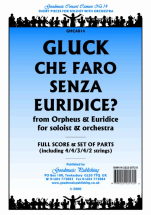Che Faro Senza Euridice
Buy this item (in stock)
Product ID: GM2 CA014
By Christoph Willibald Ritter Von Gluck
Publisher:
Goodmusic
Series:
Concert Cameos
Genre:
Classical
Line Up:
String Orchestra (Solo: Any)
Duration:
3:00
Level: 3
Set & Score
This item is in stock
About this item
Orpheus' aria "What is life without Euridice?" can beperformed with voice or virtually any solo instrument as parts are provided in various transpositions.
Instrumentation
Solo voice or instrument (Parts provided for voice, instrument in treble clef in C, Bb, Eb and bass clef) Strings (Violin 1, Violin 2, Viola, Cello & Bass) Harpsichord
Reviews and rating
No review available, be the first to write one!

Composer
Christoph Willibald Ritter Von Gluck (1714-1787)
Christoph Willibald Ritter von Gluck (2 July 1714 in Erasbach near Berching (Upper Palatinate) – 15 November 1787 in Vienna) was an opera composer of the early classical period. After many years at the Habsburg court at Vienna, Gluck brought about the practical reform of opera's dramaturgical practices that many intellectuals had been campaigning for over the years. With a series of radical new works in the 1760s, among them Orfeo ed Euridice and Alceste, he broke the stranglehold that Metastasian opera seria had enjoyed for much of the century.
The strong influence of French opera in these works encouraged Gluck to move to Paris, which he did in November 1773. Fusing the traditions of Italian opera and the French national genre into a new synthesis, Gluck wrote eight operas for the Parisian stages. One of the last of these, Iphigénie en Tauride, was a great success and is generally acknowledged to be his finest work. Though he was extremely popular and widely credited with bringing about a revolution in French opera, Gluck's mastery of the Parisian operatic scene was never absolute, and after the poor reception of his Echo et Narcisse he left Paris in disgust and returned to Vienna to live out the remainder of his life.
More info about the composer...



 Click above to view samples
Click above to view samples
